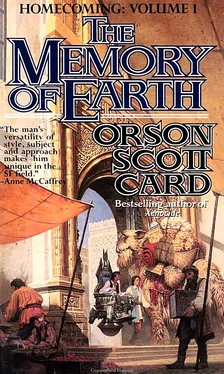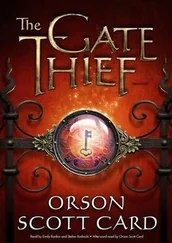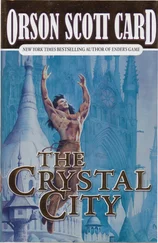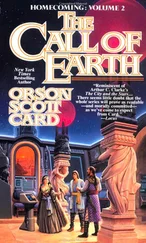Orson Card - The Memory of Earth
Здесь есть возможность читать онлайн «Orson Card - The Memory of Earth» весь текст электронной книги совершенно бесплатно (целиком полную версию без сокращений). В некоторых случаях можно слушать аудио, скачать через торрент в формате fb2 и присутствует краткое содержание. Жанр: Фантастика и фэнтези, на английском языке. Описание произведения, (предисловие) а так же отзывы посетителей доступны на портале библиотеки ЛибКат.
- Название:The Memory of Earth
- Автор:
- Жанр:
- Год:неизвестен
- ISBN:нет данных
- Рейтинг книги:5 / 5. Голосов: 1
-
Избранное:Добавить в избранное
- Отзывы:
-
Ваша оценка:
- 100
- 1
- 2
- 3
- 4
- 5
The Memory of Earth: краткое содержание, описание и аннотация
Предлагаем к чтению аннотацию, описание, краткое содержание или предисловие (зависит от того, что написал сам автор книги «The Memory of Earth»). Если вы не нашли необходимую информацию о книге — напишите в комментариях, мы постараемся отыскать её.
The Memory of Earth — читать онлайн бесплатно полную книгу (весь текст) целиком
Ниже представлен текст книги, разбитый по страницам. Система сохранения места последней прочитанной страницы, позволяет с удобством читать онлайн бесплатно книгу «The Memory of Earth», без необходимости каждый раз заново искать на чём Вы остановились. Поставьте закладку, и сможете в любой момент перейти на страницу, на которой закончили чтение.
Интервал:
Закладка:
Aunt Rasa nodded. "I know. I knew it was. It would just be ..."
"Simpler."
"Yes." She smiled ruefully. "Simpler if Gaballufix were as innocent as he pretends. But not true to character. You know why I lapsed him?"
"No," said Luet. Nor did she want to know-by long custom a woman never told her reasons for lapsing a man, and it was a hideous breach of etiquette to ask or even speculate on the subject.
"I shouldn't tell, but I will-because you're one whot must know the truth in order to understand all things."
I'm also a child, thought Luet. You'd never tell any of your other thirteen-year-olds about such things. You'd never even tell your daughter. But I, I am a seer, and so everything is opened up before me and I am forbidden to remain innocent of anything except joy.
"I lapsed him because I learned that he ..."
Luet braced herself for some sordid revelation, but it did not come.
"No, child, no. Just because the Oversold speaks to you doesn't mean that I should burden you with my secrets. Go, sleep. Forget my questions, if you can. I know my Wetchik. And I know Gaballufix, too. Both of them, down to the deepest shadow of their souls. It was for my daughters' sake that I wished to find some impossible thing, like Gabya's innocence." She chuckled. "I'm like a child, forever wishing for impossible things. Like your vision in the woods, before I drew you up to the portico. You saw all my most brilliant nieces, like a roll call of judgment."
Brilliant? Shedemei and Hushidh, yes, but Dol and Eiadh, those women of paint and tinsel?
"I was so happy to know that the Oversoul knew them, and linked them with me and you in the vision she sent. But where were my daughters, Lutya? I wish that you had seen my Sevya and my Koya. I do wish that-is that silly of me?"
Yes. "No."
"You should practice lying more," said Aunt Rasa, "so you'd be better at it. Go to bed, my sweet seer." Luet obeyed, but slept little.
In the days that followed, the turmoil in the city increased, to the point where it was almost impossible for classes to continue in Aunt Rasa's house. It wasn't just the constant worry, either. It was the disappearance of so many faces, especially from the younger classes. Only a few children were withdrawn because their parents disapproved of Rasa's political stance. Children were being taken out of every teaching household, great or common, and restored to their families; many families had even closed up their houses and gone on unnamed holidays to unknown places, presumably waiting for whatever terrible day was coming to be over,
How Luet envied Nafai and Issib, safe as they were in some distant land, not having to live in constant fear in this city that had so long been known by the poets as the Mountain of Peace.
As the petition for the banning of Gaballufix gained support in the council, Gaballufix himself became bolder in the way he used his soldiers in the streets. There were more of them, for one thing, and there was no more pretense of protecting the citizenry from tolchocks. The soldiers accosted whomever they wanted, sending women and children home in tears, and beating men who spoke up to them.
"Is he a fool?" Hushidh asked Luet one day. "Doesn't he know that everything his soldiers do gives his enemies one more reason to ban him?"
"He must know," said Luet, "and so he must want to be banned."
"Then hasten the day," said Hushidh, "and good riddance to him."
Luet waited for a vision from the Oversold, some message of warning she should take to the council. Instead the only vision that came was a word of comfort to an old woman in the district of Olive Grove, assuring her that her long-lost son was still alive, and homebound on a ship that would reach port before too long. Luet didn't know whether to be comforted that the Oversoul still took the rime to answer the heartfelt prayers of broken-hearted women, or infuriated that the Oversoul was spending time on such matters instead of healing the city before it tore itself apart.
Then at last the most feared moment came. The doorbell clanged, and strong fists beat on the door, and when the door was thrown open, there stood a dozen soldiers. The servant who opened the door screamed, and not just because they were armed men in perilous times. Luet was among the first to come to the aid of the terrified servant, and saw what had so unnerved her. All the soldiers were in identical uniforms, with identical armor and helmets and charged-wire blades, as might be expected-but inside those helmets, each one also had an identical face.
It was Rasa's oldest niece, Shedemei, the geneticist, who spoke to the soldiers. "You have no legitimate business here," she said. "No one wants you. Go away."
"I'll see the mistress of this household or I'll never go," said the soldier who stood in front of the others.
"She has no business with you, I said."
But then Aunt Rasa was there, and her voice rang clear. "Close the door in the face of these hired criminals," she said.
At once the lead soldier laughed, and reached his hand to his waist. In an instant he was transformed before their eyes, from a youngish, dead-faced soldier to a middle-aged man with a grizzled beard and fiercely bright eyes, stout but not soft-bellied, clothed not in armor but in quietly elegant clothing. A man of style and power, who thought the whole situation was enormously amusing.
"Gabya," said Aunt Rasa.
"How do you like my new toys?" asked Gaballufix, striding into the house. Women and girls and young boys parted to make way for him. "Old theatrical equipment, out of style for centuries, but they were in a stasis bubble in the museum and the maker machines still remembered how to copy them. Holocostumes, they're called. All my soldiers have them now. It makes them somewhat hard to tell apart, I admit, but then, I have the master switch that can turn them all off when I want."
"Leave my house," said Rasa.
"But I don't want to," said Gaballufix. "I want to talk to you."
"Without them^ you can speak to me any time. You know that, Gabya."
"I knew that mce? said Gaballufix. "Truth to tell, O noblest of my mates," my unforgotten bed-bundle, I knew that my soldiers would never impress you-I just wanted to show you the latest fashion. Soon all the best people will be wearing them."
"Only in their coffins," said Aunt Rasa.
"Do you want to hold this conversation in front of the children, or shall we retire to your sacred portico?"
"Your soldiers wait outside the door. The locked door."
"Whatever you say, O mother of my duet of sweet songbirds. Though your door, with all its locks, would be no barrier if I wanted them inside."
"People who are sure of their power don't have to brag," said Aunt Rasa. She led the way down the corridor as Shedemei closed and barred the front door in the soldiers' faces.
Luet could still hear the conversation between Aunt Rasa and Gaballufix even after they turned a corner and were out of sight.
"I don't have to brag," Gaballufix was saying. "I do it for the sheer joy of it/
Instead of answering, though, Aunt Rasa called loudly down the corridor.
"Luet! Hushidh! Come with me. I want witnesses."
At once Luet strode forward, with Hushidh beside her at once. Because Aunt Rasa had brought them up, they didn't run, but their walk was brisk enough that they had turned the corner and could hear Gaballufix's last few whispered words before they caught up. "... not afraid of your witchlets," he was saying.
Luet gave no sign that she had heard, of course. She knew that Hushidh's face would be even less expressive.
Out on the portico, Gaballufix made no pretense of respecting the boundary of Aunt Rasa's screens. He strode directly to the balustrade, looking out at the view that was forbidden to the eyes of men. Aunt Rasa did not follow him, so Luet and Hushidh also remained behind the screens. At last Gaballufix returned to where they waited.
Читать дальшеИнтервал:
Закладка:
Похожие книги на «The Memory of Earth»
Представляем Вашему вниманию похожие книги на «The Memory of Earth» списком для выбора. Мы отобрали схожую по названию и смыслу литературу в надежде предоставить читателям больше вариантов отыскать новые, интересные, ещё непрочитанные произведения.
Обсуждение, отзывы о книге «The Memory of Earth» и просто собственные мнения читателей. Оставьте ваши комментарии, напишите, что Вы думаете о произведении, его смысле или главных героях. Укажите что конкретно понравилось, а что нет, и почему Вы так считаете.









